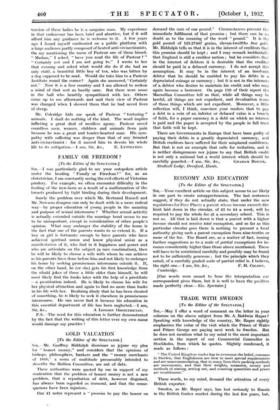GOLD VALUATION
[To the Editor of the SPEcrieroa.]
SIR,—Mr. Geoffrey Biddulph dismisses as jejune my plea for " honest money," and considers that the opinions of bishops-, philosophers•, bankers and the " money merchants of 1810," a noun of multitude presumably intended to describe the Bullion Committee, are out of date.
These authorities were quoted by me in support of my contention that the problem of honest money is not a new problem, that a repudiation of debt, however disguised, has always been regarded as immoral, and that the conse- quences have been injurious.
Our £1 notes represent a " promise to pay the bearer on demand the sum of one pound." Circumstances prevent the Immediate fulfilment Of that promise ; but there can be no doubt as to the meaning of the word " pound." It is the gold pound of 123.27447 grains, eleven-twelfths fine gold. Mr. Biddulph tells us that it is in the interest of creditor that this promise should be kept ; and I may remark incidentally that England is still a creditor nation ; but he considers that in the interest of debtors it is desirable that the creditor should be paid in a debased currency. I do not accept this assumption. It may be in the interest of an insolvent debtor that he should be enabled to pay his debts in a depreciated coinage or currency ; but it is not in the interests of a. debtor who desires to maintain his credit, and who may again become a borrower. On page 110 of their report the Macmillan Committee tell us that, while all things may be lawful, all things are not expedient, and devaluation is one of those things which are not expedient. Moreover, a little reflection will, I think, convince your readers that to pay a debt in a coin of an inferior or debased value is a breach of faith, for a paper currency is a debt on which no interest is paid and the paper is accepted by the people in full trust that faith will be kept.
There are Governments in Europe that have been guilty of paying their debts in a greatly depreciated currency, and British creditors have suffered for their misplaced confidence. But that is not an example that calls for imitation, and it is neither disingenuous nor jejune to say that British credit is not only a national but a world interest which should be














































 Previous page
Previous page